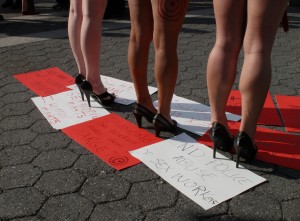Best Practices Policy Project and other groups working for the human rights of sex workers and people in sex trade has been engaging with the latest round of the United Nations’ Universal Periodic Review (UPR). This is a continuation of excellent grassroots community organizing around the last round of the UPR in 2010/2011. We submitted a shadow report along with our friends at Desiree Alliance and SWOP-NYC.
You can view the United States’ assessment of its own human rights record as reported to the Human Rights Council here. Now that the government has submitted their report, the next steps for grassroots advocacy are to contact the US government about our shadow reports, as well as contact the diplomatic missions of other countries to encourage them to submit recommendations to the US to support the human rights of people in sex trades. We are participating in several upcoming opportunities for these activities
- United States government consultation on the UPR, February 20, 2014, 10am-12pm, Department of State, Washington, DC
- This is a meeting between advocacy groups and US government officials to discuss the US report as well as the issues covered in shadow reports. RSVPs for the meeting were due Feb 13.
- US Human Rights Network Country Consultation and Diplomatic Dialogue, February 20, 2014 1-4pm, Howard University, Washington, DC
- The US Human Rights Network is inviting diplomatic representatives and grassroots human rights groups to this meeting to discuss the US human rights record for the UPR.
- Pre-session on states to be reviewed in 22nd session of the UPR, April 7-10, 2015, Geneva, Switzerland
- This is another opportunity for grassroots human rights advocates to directly communicate with diplomatic representatives about what we want the US to change, organized by the group UPR-Info.
- UN Human Rights Council Review of the United States of America, May 11, 2015, United Nations, Geneva Switzerland
- During this official proceeding of the UN Human Rights Council, diplomats from various countries will present recommendations to the US on human rights issues, and hear from the US about its own assessment of its record. In the days leading up to the official presentation, human rights advocates will meet with diplomatic representatives to ask them to make specific recommendations about certain human rights issues, such as Recommendation 86 in the last round.
If you would like to contact policy makers in the US or in the diplomatic missions of other countries, this one-page summary may be helpful.

